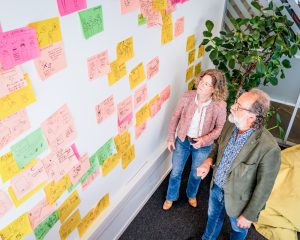Unleashing collective intelligence
Technology is developing at an exponential rate.
The impact is already felt in many domains of our daily lives: Our cars have become iPads on wheels and will partly become autonomous robots. We are addicted to the information flow of our smartphones. Our homes are becoming “smart,” and we watch TV via the Internet.
Corona accelerated the adoption of remote work and online meetings by at least two years. The pandemic also sped up the digitalization of healthcare.
How can researchers, innovators, founders, investors and entrepreneurs best use our collective intelligence to focus on future challenges? How can we create innovative processes and explore all the possibilities?
The question becomes, “Are we fast enough? Can we scale fast enough?”
Innovation by trial and error
One limiting factor is that knowledge generation and dissemination are normally followed by industrialization via existing companies or by founding startups. If we really want to speed up, the least we should do is practice concurrent innovation.
An even bolder move would be innovation through trial and error, through iteration loops and through learning by doing. And, of course, we need to devote more resources to innovation, including capital and talent.
In fact, if we co-innovate by bringing together people from research and from industry, we will accelerate all innovation processes, balancing between creative disruption divergence and focus.
This is what we want to achieve with Eindhoven Engine and this is also why I am on the Board at LUMO Labs.
Collective intelligence
It’s crucial to motivate researchers and executives to unite in our efforts to accelerate innovation.
In the university research space, our corporate partners make sure we have the resources to understand, then solve, real-world problems. At the same time, this collaboration allows us the freedom to look far into the future, anticipate what’s coming next, then leverage these insights.
This stimulates researchers to invent new solutions in the form of new theories and new designs. Combining new ideas with young entrepreneurs as well as experienced people into startups or new business for existing companies leads naturally to new implementations in society.
Cross-domain information exchange is crucial to co-creation. We call this “enabling” or “unleashing” our collective intelligence. It is obvious to implement in established ecosystems such as Brainport. And digital networking will also help build and sustain a global network of innovators dedicated to exponential innovation.
We are living in a very interesting time, when new technologies emerge so quickly, and societal challenges are so compelling.
We see the potential, and we should do our utmost to increase the speed of innovation. Connecting people and using our networks are the key ingredients for success. In the end, it is all about people and unleashing their full potential.
Prof.dr. Maarten Steinbuch
Scientific Director Eindhoven Engine
Member Advisory Board LUMO Labs
